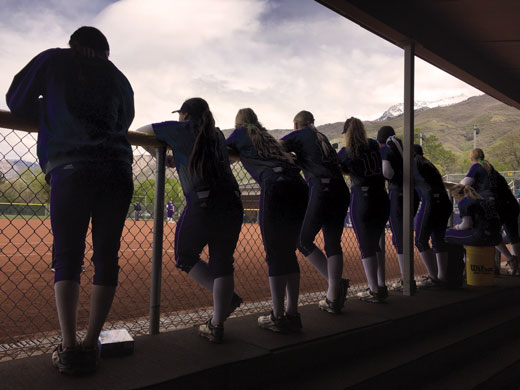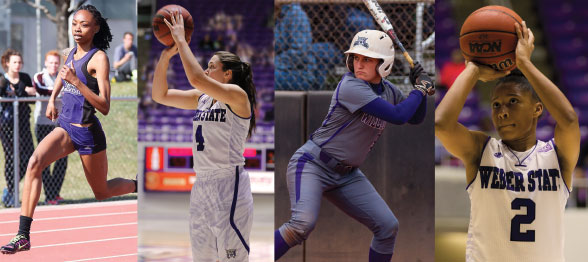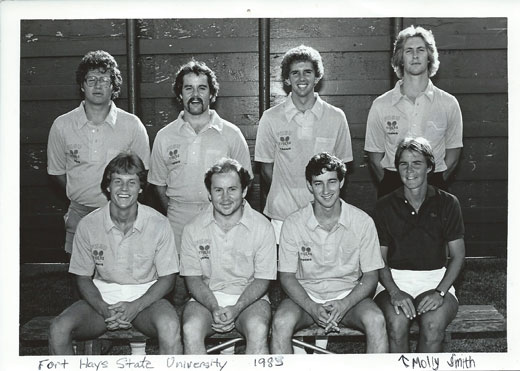Play Like a Girl

When Coach Mary Kay Amicone said it would be cold in the dugout, she wasn’t kidding. Despite my base layer and Weber State sweatshirt, I was shivering. Amicone tossed me a jacket; it helped, a little. It was a freezer box down there on this particular windy April afternoon, but the Wildcats weren’t cold. Quite the opposite actually — they were on fire. This was the third and final game in the series against Sacramento State, and the Wildcats were looking for a sweep.
Amicone gathered everyone for a pregame huddle to report that the Hornets had changed their lineup. “They’ve put three lefties in a row. Remember, number 84 is the slapper, just to let you know what you’re up against. All right? Let’s have a great day,” she said, clapping, and the girls dispersed to warm up.
I took my spot on an upturned bucket. Athletic trainer Nancy Weir looked over and calmly said, “I’ll be sure to let you know who tends to smack foul balls this way.” And I scooted my bucket a little farther back. The stands were packed, and Eminem’s song Lose Yourself blasted over the loudspeaker …
“Look. If you had one shot or one opportunity to seize everything you ever wanted, in one moment, would you capture it or just let it slip?”
For the Wildcats, Eminem’s question was a no-brainer. They would capture it. Hot on the trail of a second consecutive Big Sky Conference championship, they would let nothing stop them — nothing.
For three hours and 45 minutes (the second-longest game in Weber State softball history), the Wildcat women battled the Hornets in a marathon 14-inning game, eventually winning 4-3 on a walk-off RBI single by senior shortstop Aubrey Whitmer BS ’16. It was exhausting, but never did they show signs of giving up. Never did they show how tired they were. Like so many of our women athletes, they stayed strong because they are Wildcats, because they are …

In 2014, Procter & Gamble aired a groundbreaking ad during Super Bowl XLVIII. It started simply, with a director asking a few young women and men to show what it was like to run, throw or fight like a girl. Each responded stereotypically, prancing around, dropping the ball and slapping instead of hitting. The director then asked pre-teen girls to do the same. They reacted differently. They ran fast. They threw hard. They punched forcefully.

The commercial ended with a young woman looking directly into the camera, telling more than 111 million viewers worldwide, “If somebody else says that running like a girl or kicking like a girl or shooting like a girl is something that you shouldn’t be doing, that’s their problem. Because if you’re still scoring and you’re still getting to the ball on time and you’re still being first, you’re doing it right. It doesn’t matter what they say.”
The commercial turned an age-old insult into a compliment. After all, who wouldn’t want to play like a girl when that girl can smack a softball out of the park like Whitmer (having braved the batting cages after my interactions with the softball team, I can tell you it’s not easy), knock down three-pointers like Deeshyra “DeeDee” Thomas, make a half-court shot backward on your knees like Kailie Quinn, sprint into the record books like Aaliyah Crawford, slide into home and come up bloodied and dirty, but smiling, like Alyson “Aly” Kulp BS ’16?
Each of these young women, and so many others, succeed because they’re focused and determined. In Thomas’ words, they “work hard to prove and improve themselves.”
When Thomas committed to Weber State in 2013, some people asked her why. “They would say, ‘Weber State? You know they don’t have the best records,’” she recalled. But for the 5-foot-6-inch guard from Clackamas, Oregon, it wasn’t about the win column. It was about being part of a program that she could believe in, that matched her style, and that she could help build.
“When I visited Weber State, the team was welcoming, and the coaches were amazing,” Thomas said. “I got to play in a pickup game, and I saw how fast-paced and hardworking everybody was. I’m a fast-paced player. It just felt right. I felt like I could make a difference here and help the program grow. It’s taken a while, but we’ve gotten better each year.”
They have indeed.
A Basketball Season to Build On
The 2015-16 women’s basketball season was one of the most exciting seasons on the books. Sensational come-from-behind wins, like the last-second 57-55 victory against the University of Portland, left fans ecstatic. Tragic losses, like the 86-83 heartbreaker in the quarterfinal round of the Big Sky Conference tournament, when Idaho sunk an unbelievable buzzer-beater in overtime to come out ahead of the Wildcats, left fans crestfallen.
Through the ups and downs, the women’s basketball team finished the regular season with a winning record and was invited to the Women’s Basketball Invitational (WBI). Early in the tournament, the ’Cats defeated New Mexico and Big Sky foe North Dakota to earn the right to host the semifinal round at the Dee Events Center. The team trounced the University of South Carolina Upstate at home 79-53 to give the Wildcats their 23rd win of the season — the best on record — and a ticket to the final, where they faced the reigning WBI champion, the University of Louisiana at Lafayette.
The title game was intense. Weber State forced UL-Lafayette into overtime with a last-second shot by Brittney Dunbar that tied the game 69-69. Both the Wildcats and Ragin’ Cajuns played hard in overtime, but when the buzzer sounded, they were again tied, this time 77-77. With seven seconds left in double overtime, Thomas found herself holding the ball — always a tough spot to be in — but wasn’t able to sink it in time. The Wildcats lost 87-85.
“I was aware of the game clock in my head, but I didn’t look up,” said Thomas, who led the Wildcats with 25 points in the game. “I was just coming down hard, determined to get that one last shot, but I got tied up with a defender and wasn’t able to get it off in time. Two points. That’s all we needed to tie it up again.”
Anguish ensued. “Oh yeah, I cried,” Thomas said. “I remember the buzzer sounding, and everything after that just went silent. I walked over to the wall, looked up and said, ‘Oh my gosh, it’s over.’ I mean, dang, we almost had it! I’ll never make that mistake again (referring to the game clock). I promise you, you really do learn from those last-minute decisions.”
Even though the final score did not swing the Wildcats’ way, Thomas was impressed by her teammates. “We all worked so hard. We all played with heart,” she said. “I’m super proud of this team.”
So is Amy Crosbie MPC ’14, Weber State’s associate athletic director and senior woman administrator. While thrilled by the basketball team’s success, she was even more delighted by what happened after the game.
Wins are Good, Character-Building is Better
“After they spent a bit of time in the locker room, some of the players chose to go out the back door of the arena, which was absolutely fine, of course, but DeeDee, she came right back out into the gym (where the other team’s fans and players were still milling about),” Crosbie said. “There were a handful of young girls waiting for her autograph. For them, it didn’t come down to that last shot. It came down to how DeeDee hustled that entire game.
“I remember sitting there on the bench just watching her interact with them and thinking how mature she was being. She could’ve come out with a ‘don’t-talk-to-me demeanor,’ but she didn’t. She came out a role model.”
That’s the kind of character Weber State works to build in its athletes. “There’s a myth that all athletes, male or female, have this ‘me mentality,’ that they only do things for themselves, but I disagree,” Crosbie said. “I think you can easily find great ones. I think you can especially find them here.”
For example, in 2015-16, WSU student-athletes — female and male — completed 7,174 volunteer service hours. That figure puts a smile on Crosbie’s face as quickly as the number of wins in a record-breaking season.
“You know, we’ve had such an amazing year sports-wise, but for me, the athletes have always been phenomenal, even before the number of wins started to go up,” Crosbie said. “I see the female athletes on a regular basis. I see how they interact with the community, how they pay attention to their grades, how responsible they are, how they give back. You can’t technically put those things into a win column, but for me, that’s my win column.”
Why are Sports Valuable for Females?
Ask that question of the Women’s Sports Foundation, and you’ll get more than 40 answers. The organization’s “Women’s Sports Facts” compilation takes up 49 pages, with pages 2-6 solely listing the benefits of women’s involvement in sports. The reasons include everything from increased self-esteem to decreased instances of depression, higher graduation rates, contentedness, positive self-body image, decreased odds of suffering a stroke or getting breast cancer, and increased community engagement.
Crosbie, once a star volleyball player at Utah State University, adds to that list: the ability to work through adversity, to work with people with diverse backgrounds and personalities, to work toward a common goal, and the desire to stay active later in life.
“All of my success, everything about me, is a result of the way I was brought up and because of my sport,” she said. “I would do it all over again — even the early mornings, the late evenings, the exhausting practices, the balancing act, the wins, the losses — in a heartbeat. I can’t go back, but I can watch our athletes find success on the field, on the courts, on the track and in life.” (Read more about Crosbie’s career at WSU on page 51.)
Thomas, who has been playing basketball since first grade, is happy with her choices, too, and is glad that she’s here, at Weber State.
“It’s not just a school. It’s not just where I play basketball,” she said, emphatically. “It’s a place where I’ve matured and a place where I, as a young woman, have learned who I am as a person, not just an athlete. I’ve learned the importance of volunteering, of helping out. I’ve learned that I love working with kids and want to go on to help children who come from troubled homes. I know I’ve made mistakes along the way, but the mistakes, they just help you grow.”
Women’s Sports, a Pre- and Post-Title IX Perspective
On the evening of June 28, 2016, I was sitting on my couch writing this story and reading about the life of Pat Summitt, the University of Tennessee’s legendary women’s basketball coach. Her death was devastating to Tennessee fans, not because of her incredible records, but because of the difference she made in the lives of women and the impact she had on sports in general.
As a Tennessee alumnus, I was heavyhearted.

A notification on my phone interrupted my thoughts. It was an email from Molly Smith, a human performance management professor at Weber State, WSU’s former NCAA faculty athletics representative, a former coach and a former student-athlete. It read, “Please watch this ESPN video on the most remarkable collegiate coach I’ve ever watched. No coach has ever stood taller. What a premature loss for all of sport and women.”
Summitt took over Tennessee’s women’s basketball program in 1974, when she was just 22. In addition to her coaching responsibilities, it’s been reported that she drove the team’s van to away games and even did the team’s laundry.
That doesn’t surprise Smith. She’s been there, done that. She and Summitt are from the same era. They both played sports pre-Title IX and coached during the years the law was being implemented. It was a difficult time, with women being emboldened to participate in sports yet facing many challenges in the process.
Smith grew up in Liberty, Missouri, where she desperately wanted to play sports. “It was a small community,” she said. “The only sport for girls was summer softball. It was for ages 8-16, and we were all on the same team.” She went to high school when Title IX was still “just a dream,” and the only sport offered to girls was tennis because “we could play in skirts.”
Then Title IX was passed in 1972.
“It was a great first step,” said Smith, who was playing tennis for the University of Missouri-Columbia when the law was enacted, “but it took about 10 years for it to really get teeth.” After graduating with her bachelor’s degree in health and physical education/fitness, she recalls being hired as a high school girl’s track coach. “I was the only track coach for girls. I had to line my own cinder track with a chalk machine. Now, keep in mind, the men’s team had four coaches. For coaching, the least paid of them received $800 in addition to his teacher’s salary, the highest paid received $1,500 additional. I got $350,” she said.
“But I loved it. I mean, I got to coach girls! They wouldn’t have had the opportunity to play sports if I hadn’t stepped up. I thought I had died and gone to heaven. They were getting to play, and I was getting to help them.”
According to the Women’s Sports Foundation, there has been a dramatic increase in girls’ and women’s participation in sports since Title IX, by 560 percent at the collegiate level and 990 percent in high schools.
Crosbie can’t imagine what it was like to have been in Smith’s shoes. “I have no idea where I would be today if I hadn’t played sports,” she said. “No idea. I would like to think I’d be successful, but I know I definitely wouldn’t be here as an associate athletic director. My sports career paved the way for where I am today.”
Title IX compliance is monitored closely at Weber State and educational institutions across the country and is still a hotly debated topic — the Women’s Sports Foundation has pages of myths and facts about the subject. But what Smith likes to point out is that Title IX wasn’t just about athletics. In fact, the word “athletics” doesn’t appear in the law.
“Think, today, of all the women in the field of medicine, in the fields of science, technology, engineering and math, in the field of law. They would not be where they are without Title IX, whether they played sports or not,” said Smith, who went on to earn her doctoral degree in exercise physiology from the University of New Mexico.
Today, young female athletes know little about Title IX. They don’t have to, fortunately. They were born at a time when, if they wanted to play sports, they could. Growing up, Quinn played softball, track and field, cross country and even football. “Then basketball fell in my lap, and I developed a love for the game. In high school, it really became a reality for me, that I was good enough to play at a Division I level,” she said.
Quinn is grateful to the women and men who worked to pass Title IX 44 years ago. “I would love to tell them thank you,” she said. “I’m proud to be an athlete. I’m proud that I work my butt off and compete. I can’t imagine not having had the opportunities I’ve had right off the bat.
“When I was little, I just wanted to do what the guys were doing, what my brother was doing. And I could. I remember when we’d have pickup games, girls were always chosen last, until we got in there and showed them what we could do. Then they changed their ways. We got picked first the next time and the time after that and the time after that ...”
And that’s music to the ears of the pre-Title IX generation who just wanted the opportunity to prove themselves.
“If you’re a female athlete, or were a female athlete, be proud of that,” Smith said. “Sports aren’t just something you do. They’re part of who you are.”
